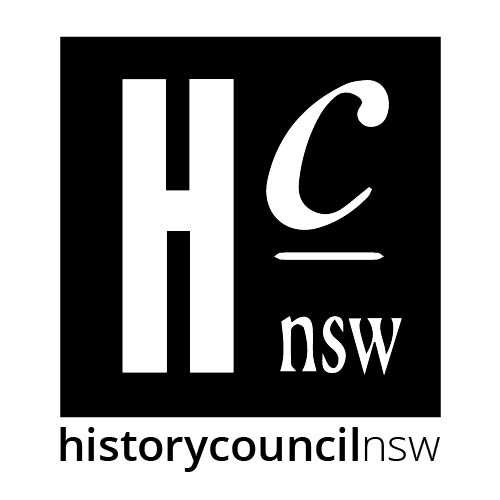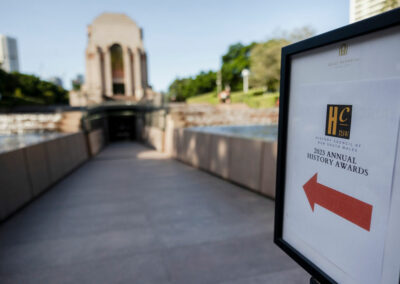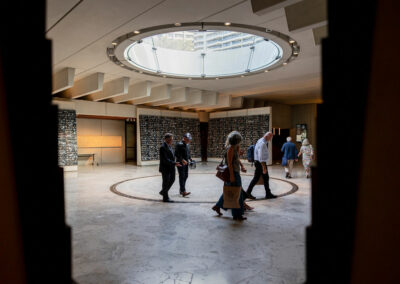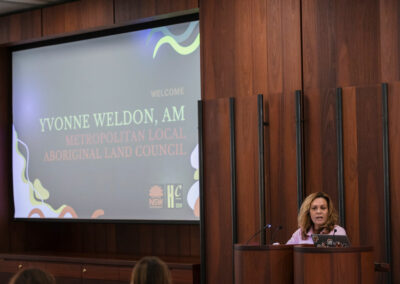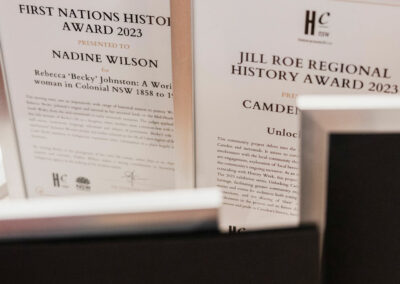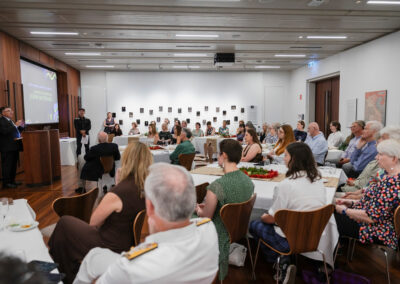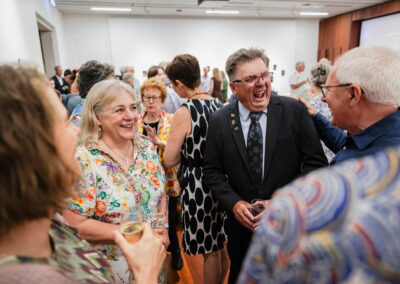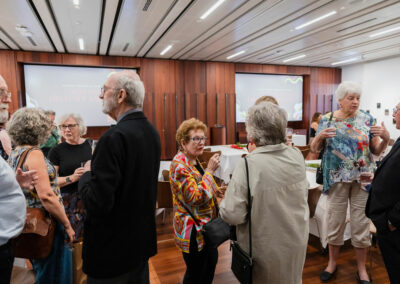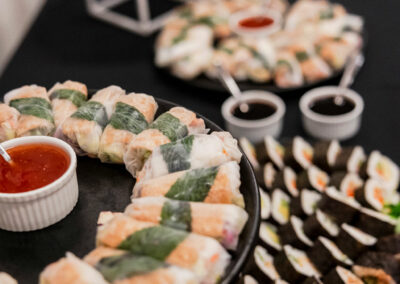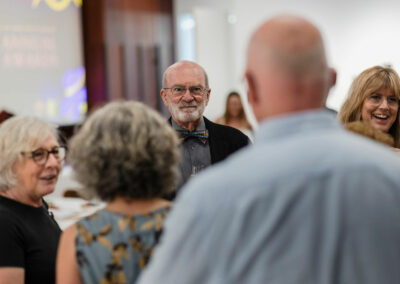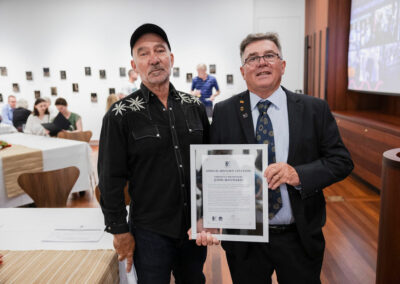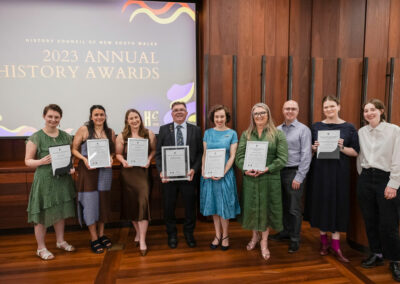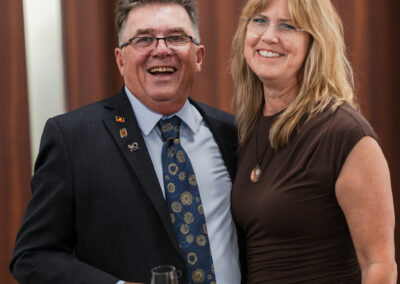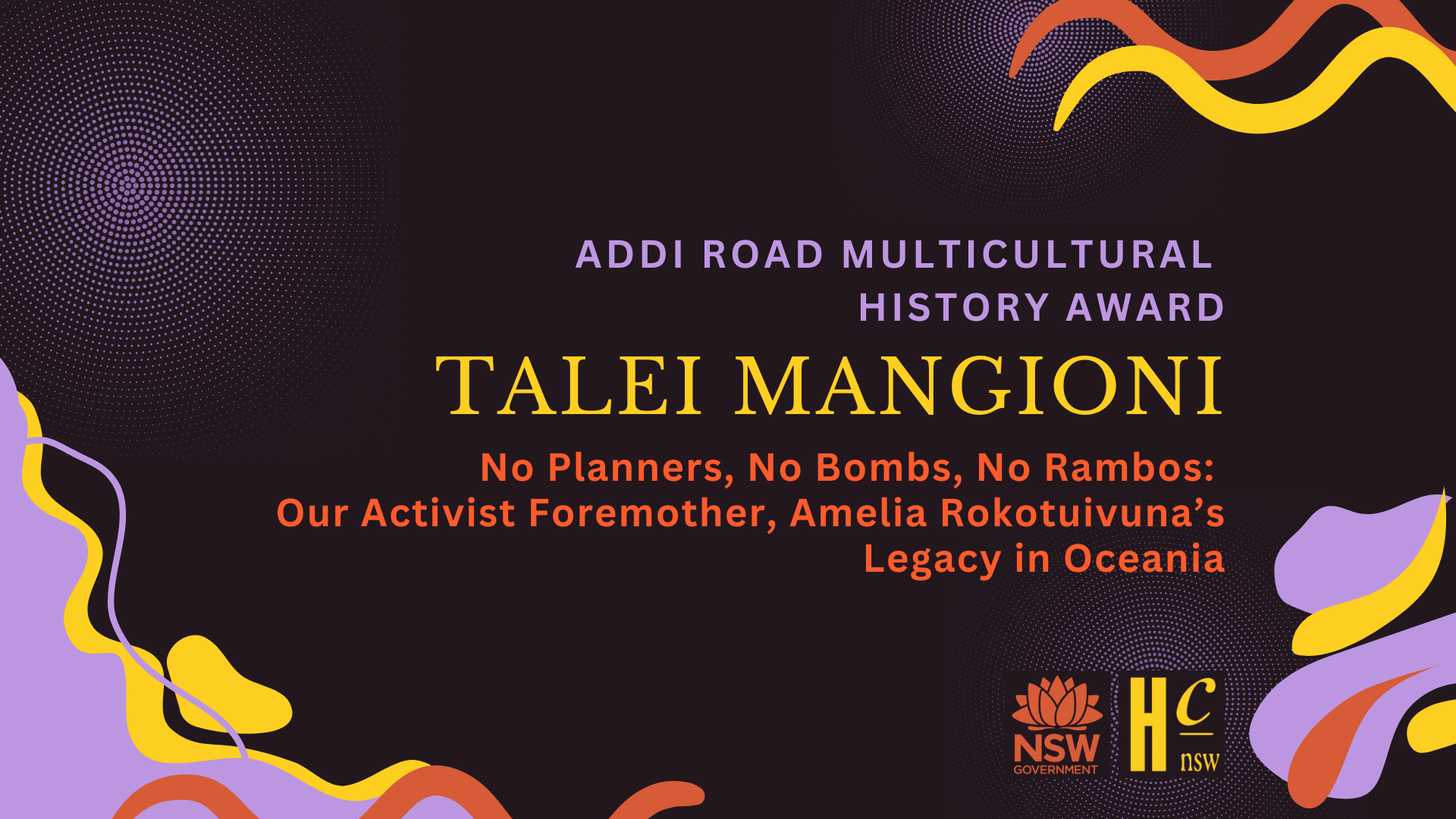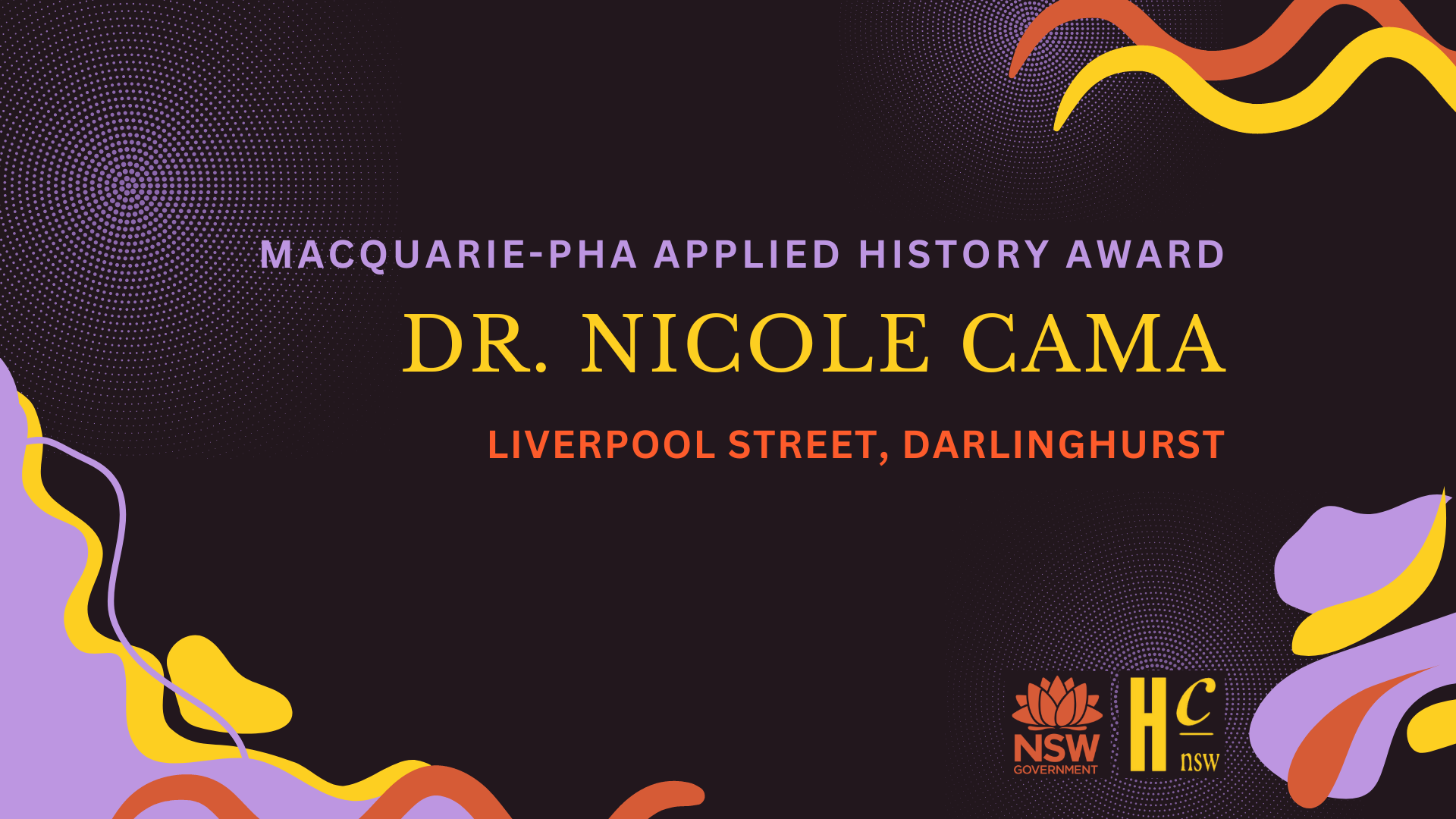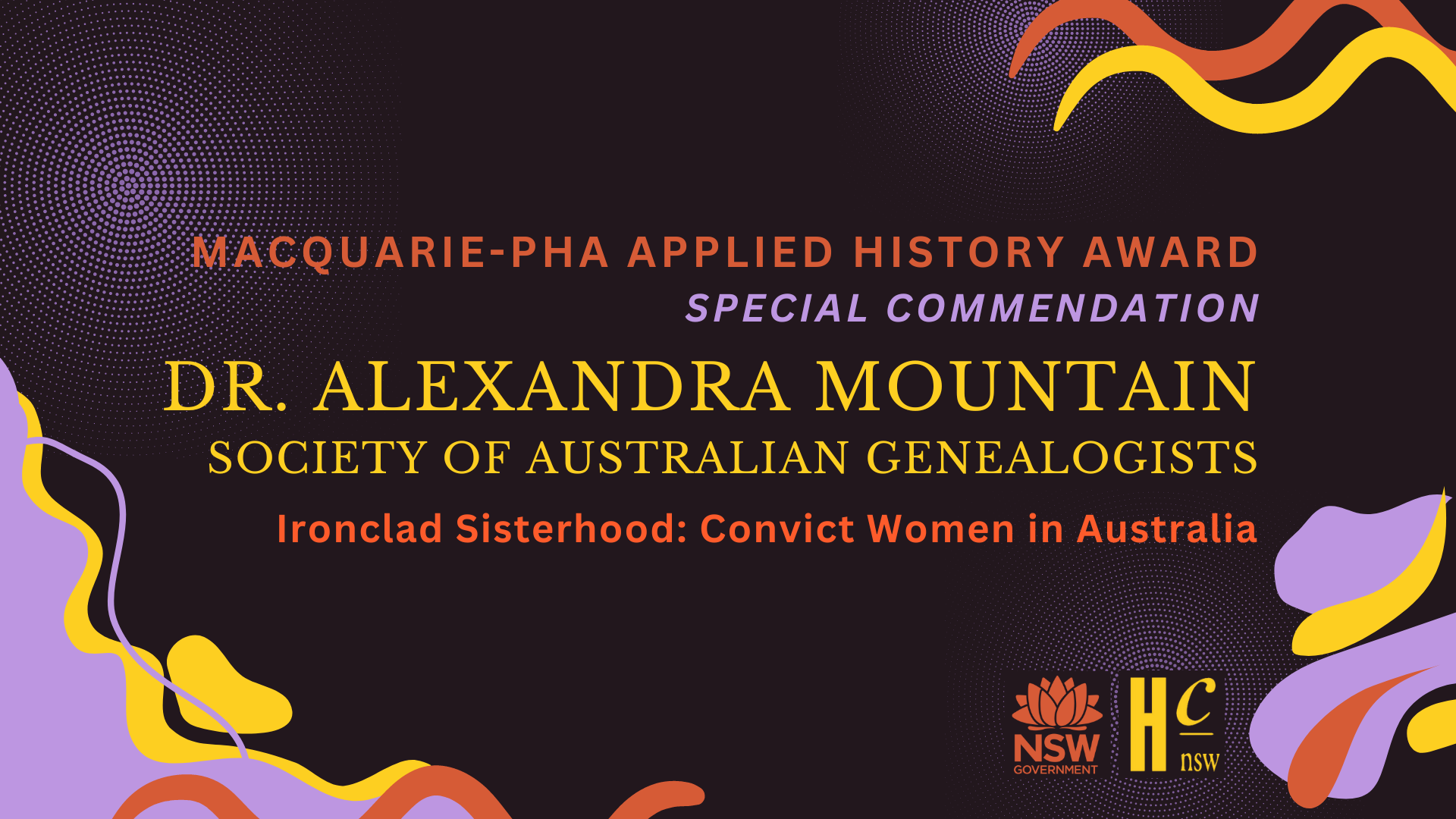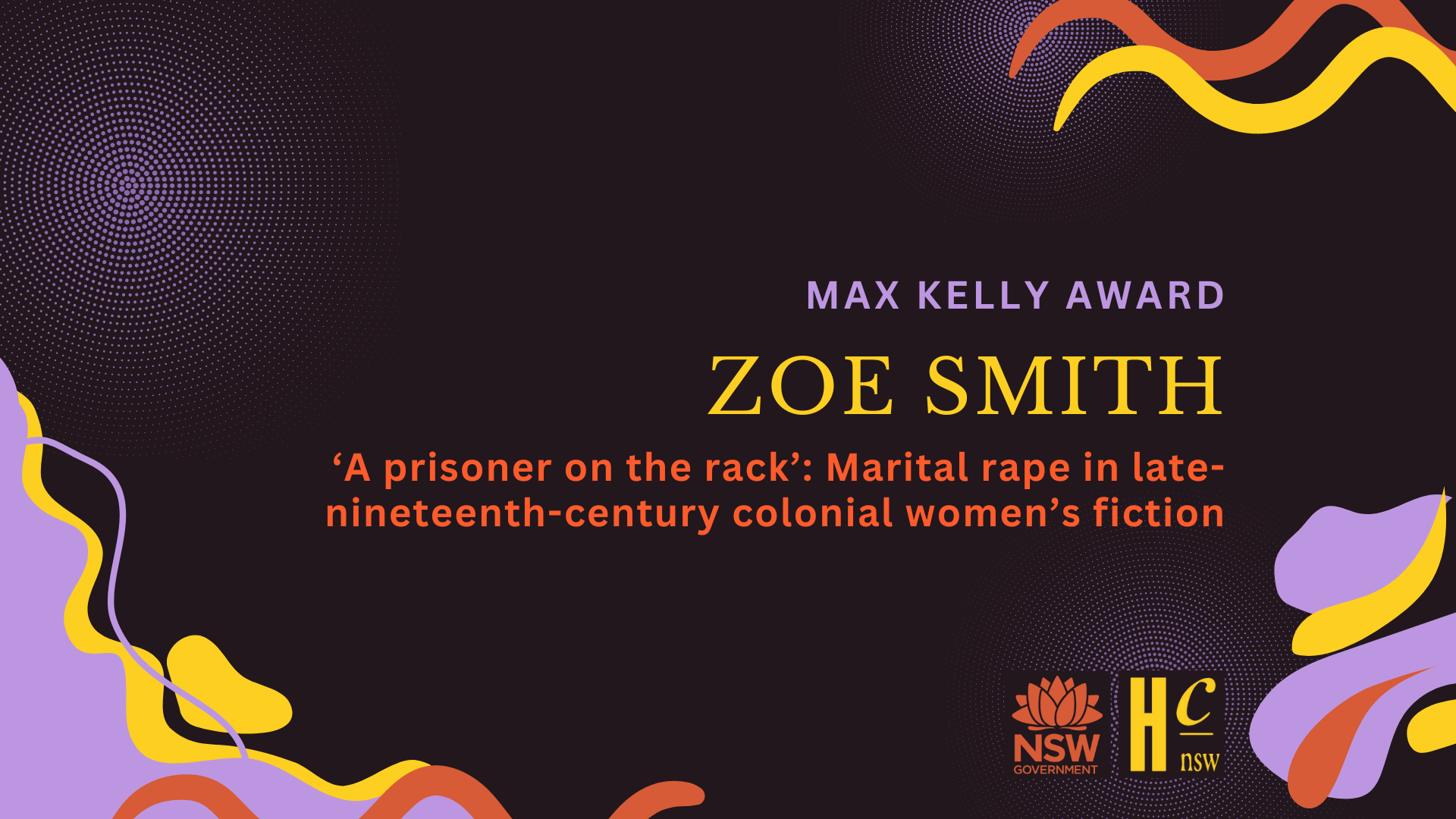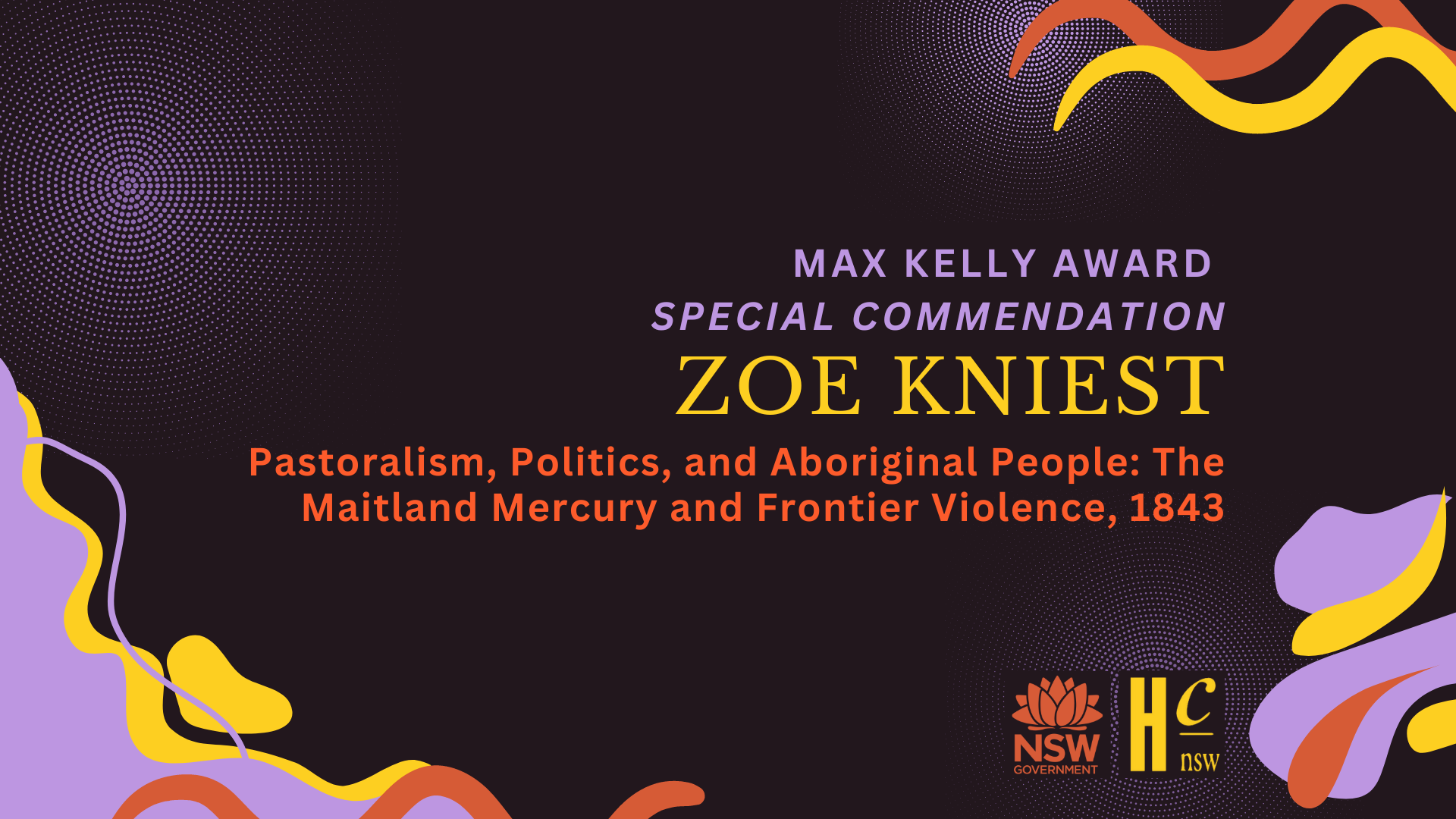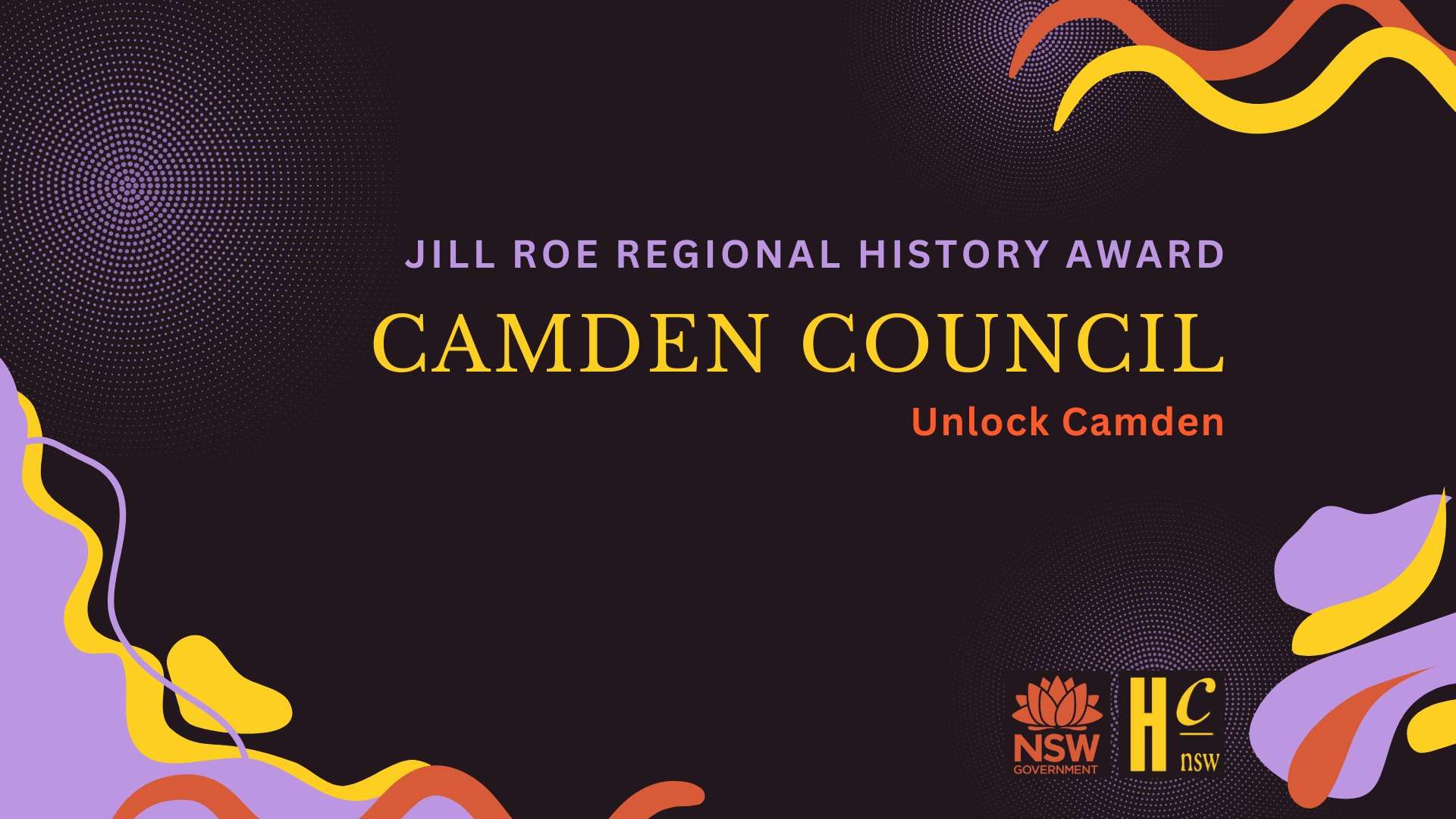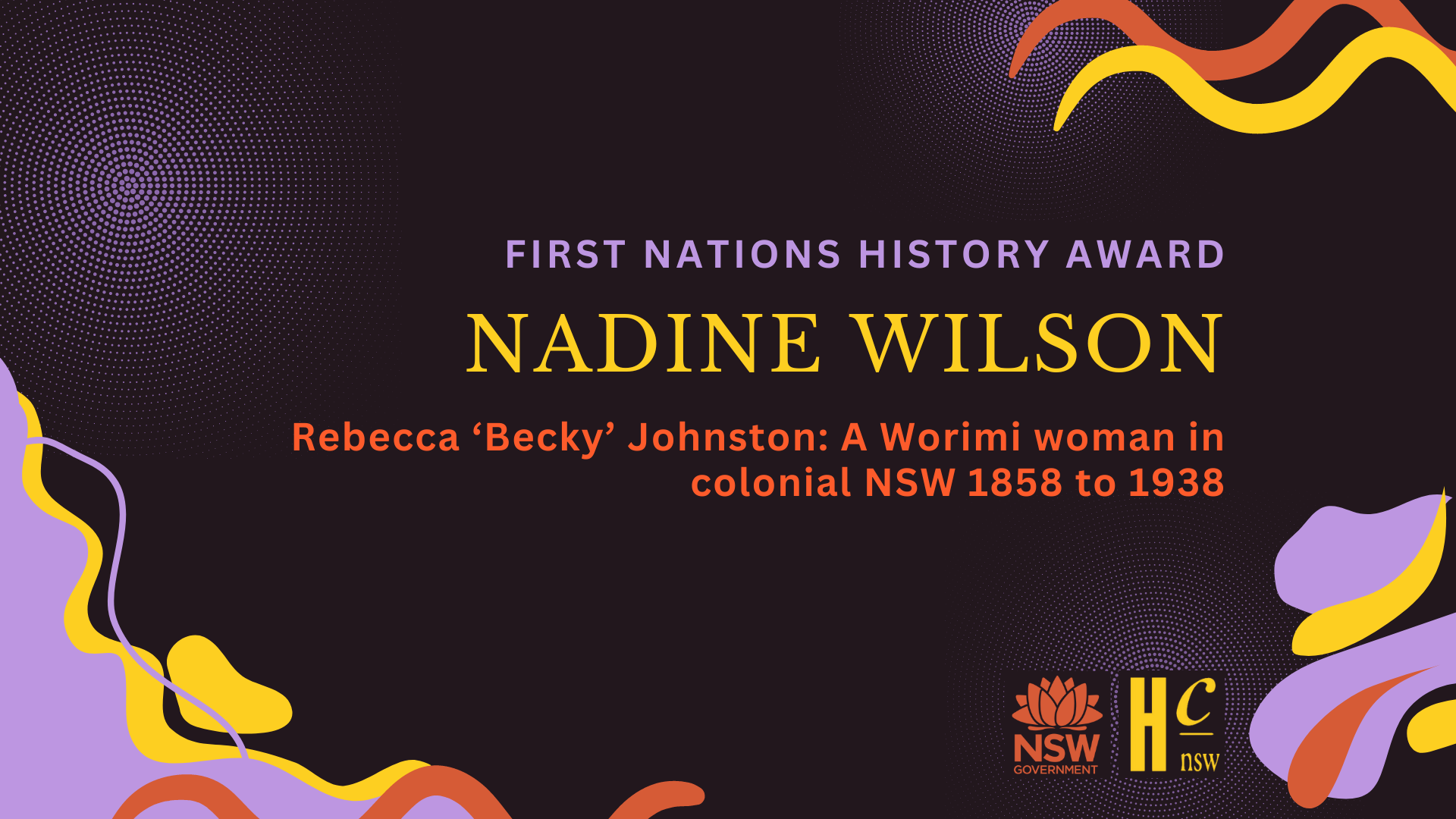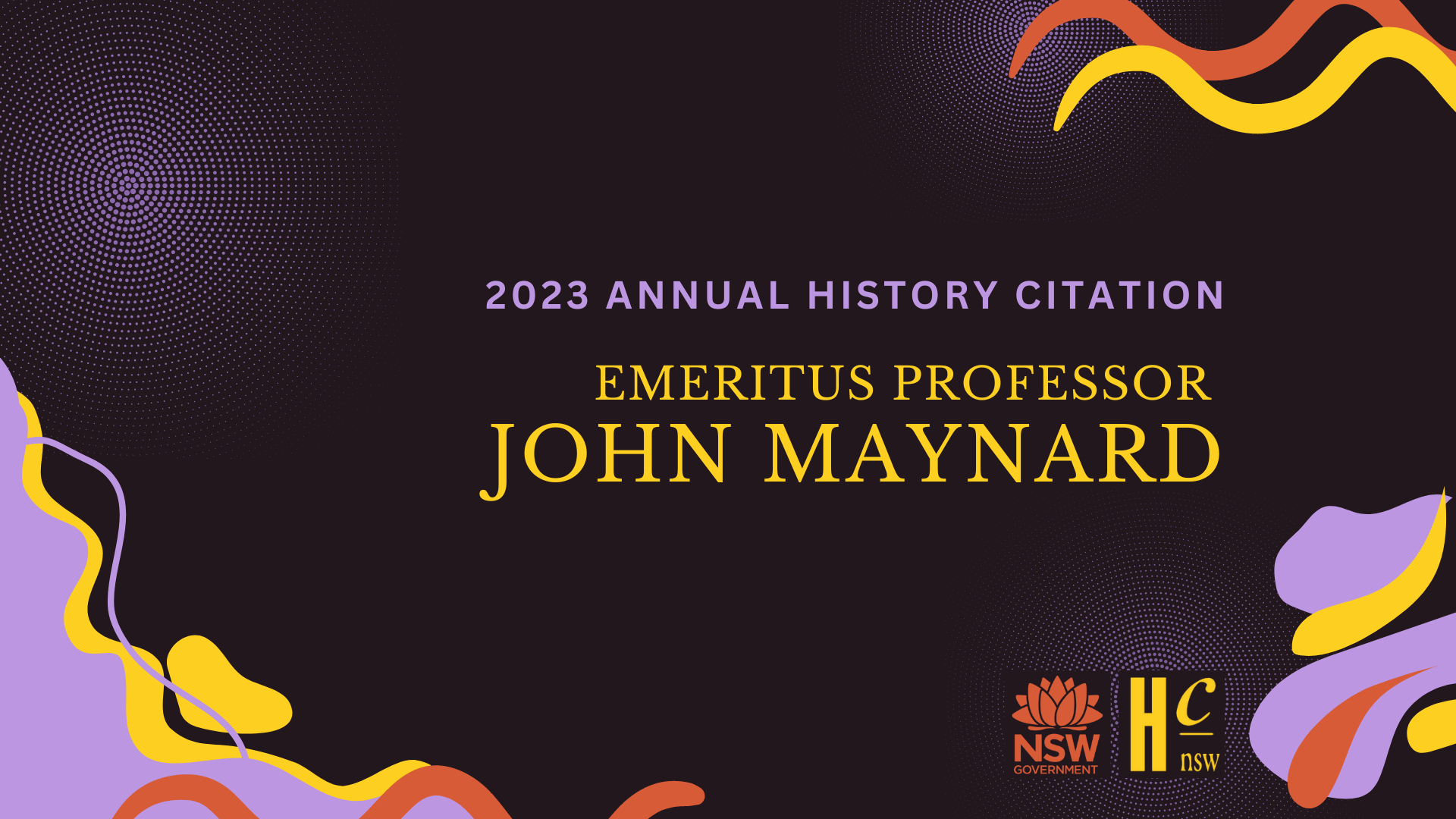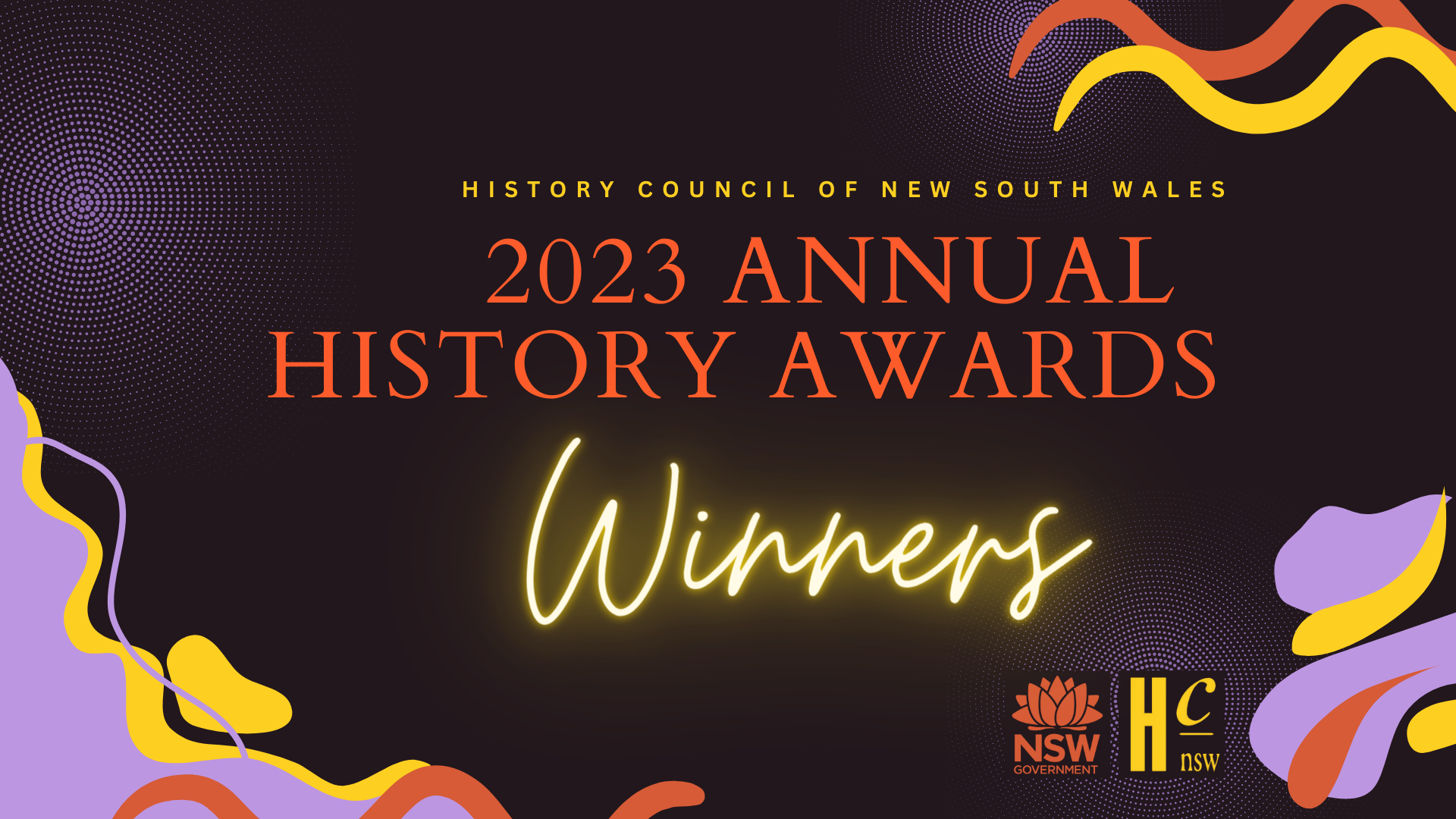
Annual History Awards 2023 Winners Announced
The vibrant essence of history came alive!
The HCNSW Annual History Awards were announced on Tuesday, 5 December, 2023 at a ceremony in the Anzac Memorial Auditorium. More than 65 members and guests helped to celebrate the winner’s achievements.
The winning entries took us on a journey through time, delving into the captivating stories and rich cultural heritage of New South Wales. There was a very strong and diverse field of applications for the Awards this year, and the judges issued not only awards in every category, but in some cases, also Commendations. Digital Histories were represented strongly, through a fascinating array of entries.
This year’s judging committee comprised of Associate Professor Jan Lanicek, Associate Professor Julie McIntyre, Mr Jeff Hopkins-Weise and Dr Naomi Parry Duncan. The judges, as well as the History Council of NSW Councillors, commend this year’s winners and thank the generosity of donors, cultural partners and the NSW government who continue to advance and promote the public understanding and appreciation of history.
Read about the winning entries below, and click through to discover their essence.
To find out more about the HCNSW Annual History Awards, click here.
If you have any questions please contact us and subscribe to our e-newsletter to receive announcements.
Scroll through some of our event photographs below.
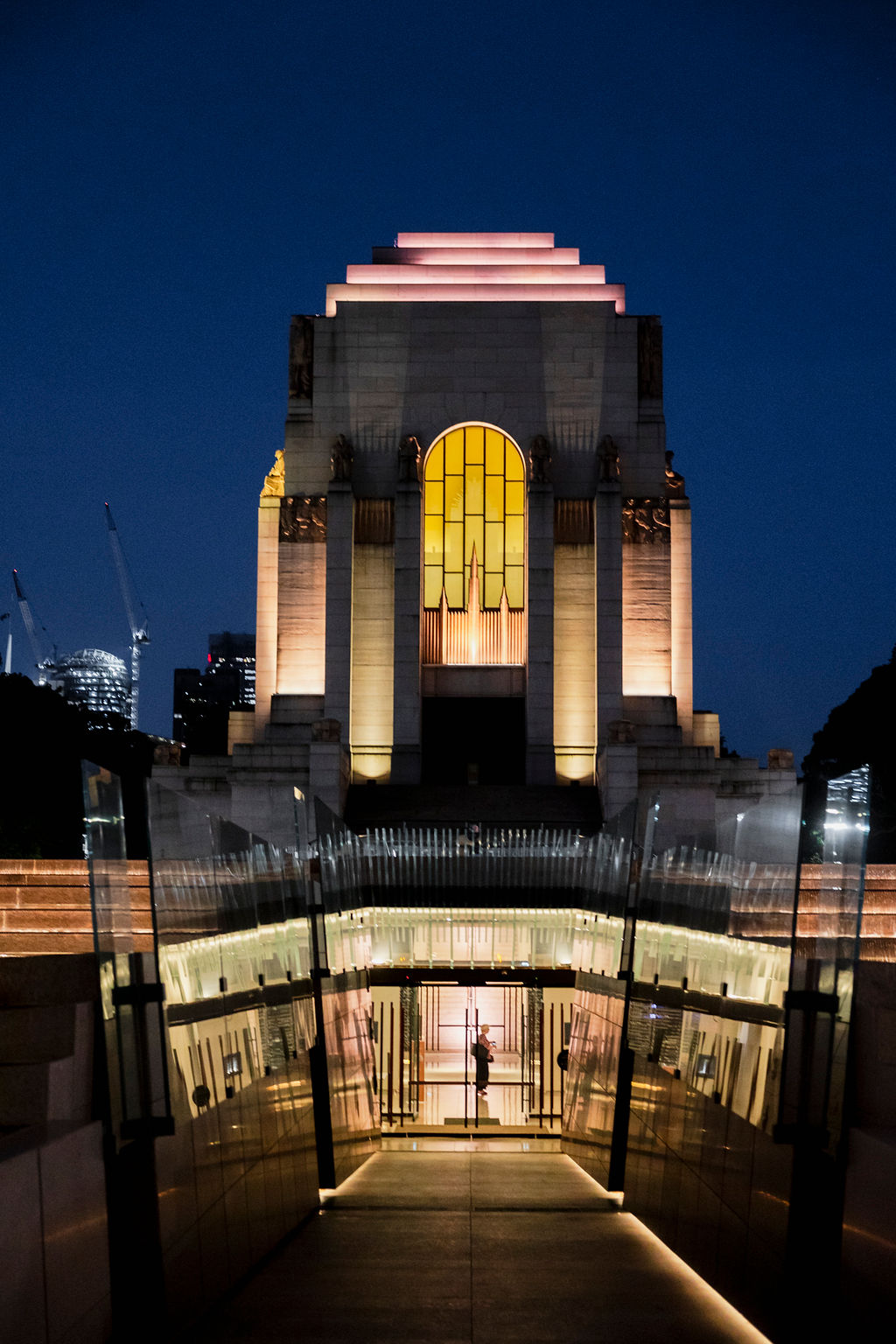
The venue for the Awards event – the Anzac Memorial. Photo Credit: Tim Harris, TWH Photography
The History Council of NSW would like to thank the Anzac Memorial for its support in the staging of this event.
Awards – people walking through Hall of Service on arrival. Photo Credit: Tim Harris, TWH Photography
Annual History Citation winner Prof John Maynard with Dr Stephen Gapps. Photo Credit: Tim Harris, TWH Photography
Winners of Annual History Awards 2023. Photo Credit: Tim Harris, TWH Photography
2023 Award winners at Anzac Memorial. Photo by TWH Photography.
The Addi Road Award for Multicultural History
Addi Road Award for Multicultural History is supported by the Addison Road Community Organisation.
The purpose of the Award is to encourage new and emerging historians to discover, analyse and explore multicultural histories and the history of multiculturalism in Australia, helping to increase academic and public engagement in a topic that has ongoing relevance to Australian history and society today.
In 2023, the winner receives a citation and a prize of $1,000. The winning entry (essay or multimedia) makes an original argument using primary historical sources and demonstrate the capacity to develop complex arguments linking the past to contemporary, multicultural issues that have, or are currently impacting on the Australian community.
This year’s Addi Road Award for Multicultural History is awarded to Talei Mangioni for her essay: No Planners, No Bombs, No Rambos: Our Activist Foremother, Amelia Rokotuivuna’s Legacy in Oceania.
Information about this winning entry can be found further down this page.
The Macquarie-PHA Applied History Award
The Macquarie-PHA Applied History Award is jointly sponsored by the Macquarie University Centre for Applied History and the Professional Historians Association (NSW & ACT).
The purpose of the Award is to encourage historians to produce a creative work of applied history drawing on their research. It aims to promote the value of public history and the pursuit of history as a rewarding professional career.
Individuals and groups are eligible to apply. The award is open to historians at all stages of their career, including those inside and outside of academic institutions; undergraduate, diploma, masters and doctoral level students; as well as professional, local, community and family historians. Candidates must have lived and/or created their work in New South Wales or the Australian Capital Territory over the 12 months preceding the deadline for submissions.
The winner receives a citation and a prize of $1,000. The winning entry will demonstrate excellence in writing or other media, and the ability to use original source materials, or demonstrated originality of interpreting the past in a contextual way. This work should engage with the field and practice of professional, public and applied history, using the past to inform contemporary concerns, issues and topics in creative ways.
Award winner: The Macquarie-PHA Applied History Award goes to Dr Nicole Cama for her entry: Liverpool Street, Darlinghurst.
Special Commendation: Dr Alexandra Mountain from Society of Australian Genealogists for another excellent digital history project, Ironclad Sisterhood: Convict Women in Australia.
Information about both entries, including links, can be found further down this page.
The Max Kelly Award
The Max Kelly Award of $500 is given annually to an early career historian for a work of excellence in any aspect of Australian history. The Award was established as a tribute to Associate Professor Maxwell John Kelly (1935-1996), the first elected President of the History Council.
The History Council of NSW is grateful to Mr Geoffrey Jones for his continuing support and generous donation of the prize money for the 2023 Max Kelly Prize.
Award Winner: Zoe Smith for her article ‘A prisoner on the rack’: Marital rape in late-nineteenth-century colonial women’s fiction.
Special Commendation: Zoe Kniest for her essay: Pastoralism, Politics, and Aboriginal People: The Maitland Mercury and Frontier Violence, 1843.
Information about these winning entries, including links to the entries, can be found further down this page.
The Jill Roe Regional History Award
The Jill Roe Regional History Award is supported by the HCNSW’s Jill Roe Bequest Fund.
The award is named in honour of Professor Jill Roe (1940-2017), an outstanding and pioneering Australian historian, the purpose of the Award is to encourage historians at any stage of their careers to discover, analyse, and explore rural and regional Australian history, helping to increase academic and public engagement in a topic that has ongoing relevance to Australian history and society today.
In 2023, the winner will receive a citation and a prize of $500. The winning entry (essay, multimedia and/or public history project) will make an original and compelling argument using primary historical sources and demonstrate the capacity to develop complex arguments linking the past to contemporary, rural and regional issues that have, or are currently having an impact on the Australian community.
The winner of the Jill Roe Regional History Award is Camden Council, for the exhibition entitled Unlock Camden. (Award accepted by Nicole Magurren, Director Planning & Environment, Camden Council).
Information about this winning entry, including links to the entry, can be found further down this page.
The First Nations History Award
The First Nations History Award is sponsored by Professor David Carment & Dr Stephen Gapps.
The History Council of NSW’s First Nations History Award, originally named the Aboriginal History Prize until 2020, was first awarded in 2016. Its purpose is to encourage students and other beginning historians (up to post-doctoral career) in the writing of Australian Aboriginal and Torres Strait Islander history from original sources. Indigenous Australians are strongly encouraged to submit entries.
The winner receives a citation and a prize of $2,500. The winning entry will demonstrate excellence in addressing its subject, proficiency in the use of original materials and clarity of exposition.
The winner of the 2023 First Nations History Award is Nadine Wilson, a PhD candidate at the University of Newcastle, for her entry: Rebecca ‘Becky’ Johnston: A Worimi woman in colonial NSW 1858 to 1938.
Information about this winning entry, including links to the entry, can be found further down this page.
Annual History Citation
Each year the History Council of NSW, via nominations from General Council members, awards the Annual History Citation to an eminent historian to honour a lifetime of service to history.
The Citation recognises individuals for outstanding research and scholarship and acknowledges their broader contribution through teaching, leadership, mentoring and community involvement.
This year we are honoured to jointly award the citation to two people who have pushed the boundaries of historical inquiry and communication, shining a light on areas of hidden or ignored history.
In 2023, the History Council of NSW is delighted to award the Annual History Citation to Emeritus Professor John Maynard. (Further information is available by scrolling down this page).
HCNSW Award Winners 2023 – details of winning entries
The Addi Road Award for Multicultural History Winner –
Talei Mangioni
for her essay: No Planners, No Bombs, No Rambos: Our Activist Foremother, Amelia Rokotuivuna’s Legacy in Oceania.
This work is a biography of prominent Indigenous Fijian feminist and socialist Amelia Rokotuivuna which highlights her immense impact on the Pacific region from the 1960s onwards. The judges commented that this essay was beautifully and assuredly written, and that the work “contributes to understanding of the difficult as well as affectionate diasporic and economic histories that connect Fiji and Australia.”
A link to this essay will be listed on our website once the article has been published in 2024.
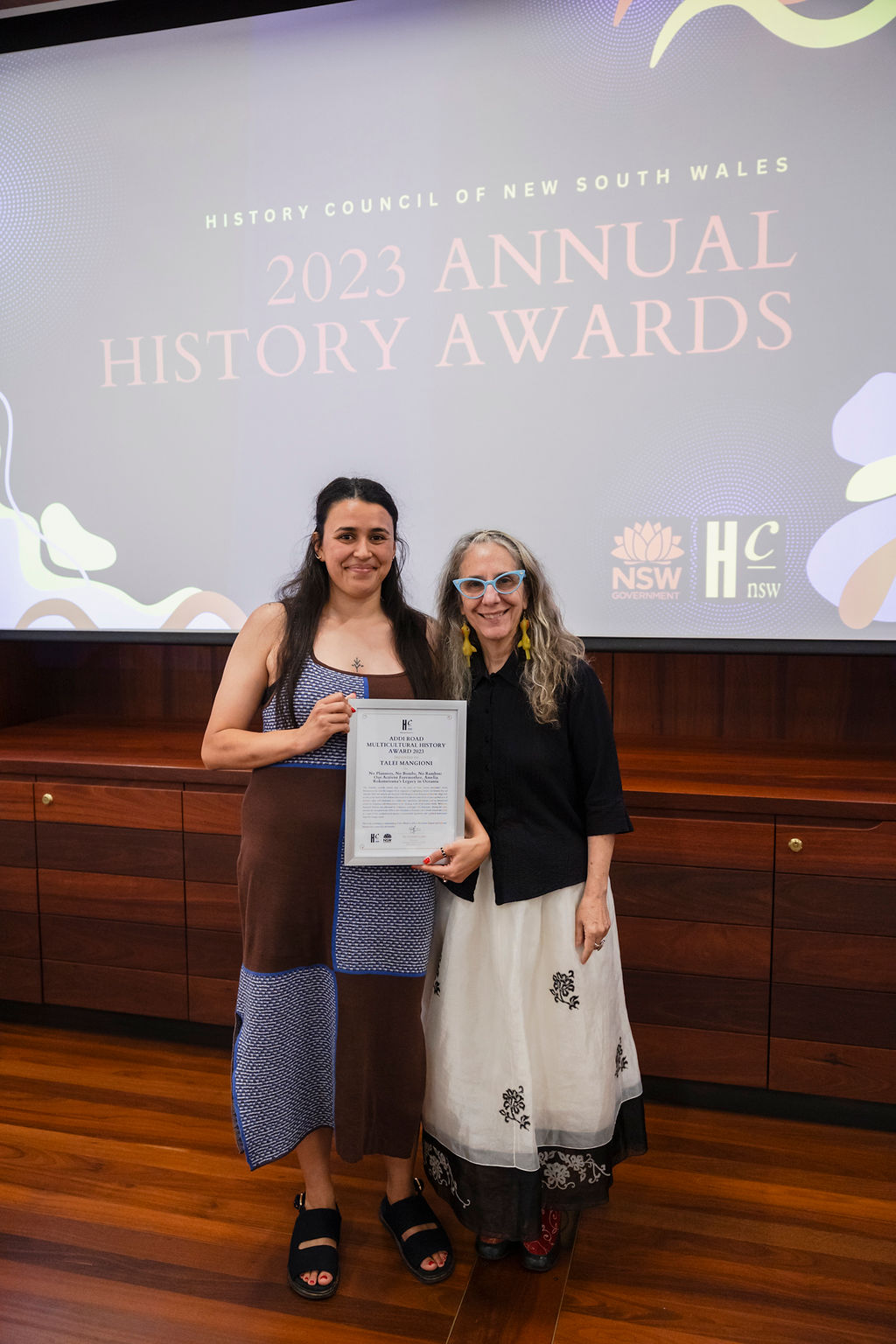
Winner: Talei Mangioni (L) and award sponsor, Rosanna Barbero (Addison Road Community Organisation). Photo credit: Tim Harris, TWH Photography.
Macquarie-PHA Applied History Award Winner –
Dr Nicole Cama
for her project Liverpool Street, Darlinghurst.
About the project
Liverpool Street, Darlinghurst is a digital history project mapping the people and places of the street from the 1850s to the 1940s, using the fascinating data and records of the City of Sydney Archives and other cultural institutions.
The City of Sydney Archives’ Assessment Books form the core source material of the website and illustrate ownership, occupation, construction and value for properties within area. The research for this project covered over 4,000 assessment book entries along with 92 maps, 250 images, 65 plans, and thousands of newspaper articles and individuals.
Using a vast array of historical materials, the website weaves together a web of demographic and urban data and stories and illustrates a place with a rich and layered past.
This project was produced by Nicole Cama (historian, writer), Nick Clark (web developer) and Wing Pang (designer/illustrator). The project was supported by the Australian Centre for Public History, UTS and the Paul Ramsay Foundation, using material from the City of Sydney Archives.
Special Commendation: Dr Alexandra Mountain from Society of Australian Genealogists for a digital history project, Ironclad Sisterhood: Convict Women in Australia, a collaborative research and digital public history project focused on reimagining the lives of convict women in Australia. This collaboration involved Dr Mountain, SAG volunteer Andrew Redfern, as well as Macquarie University students, Georgia Charlier, Alexandra Scouller, and Christina Wisniewski.
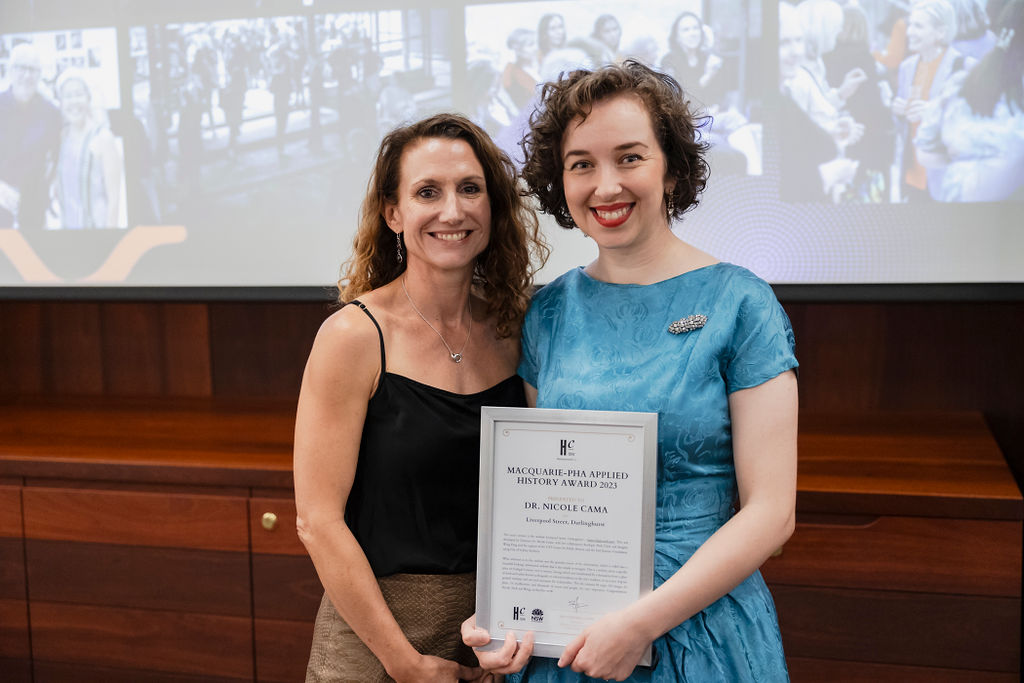
Winner: Dr Nicole Cama (R) with Professor Tanya Evans (MQ). Photo credit: Tim Harris, TWH Photography.
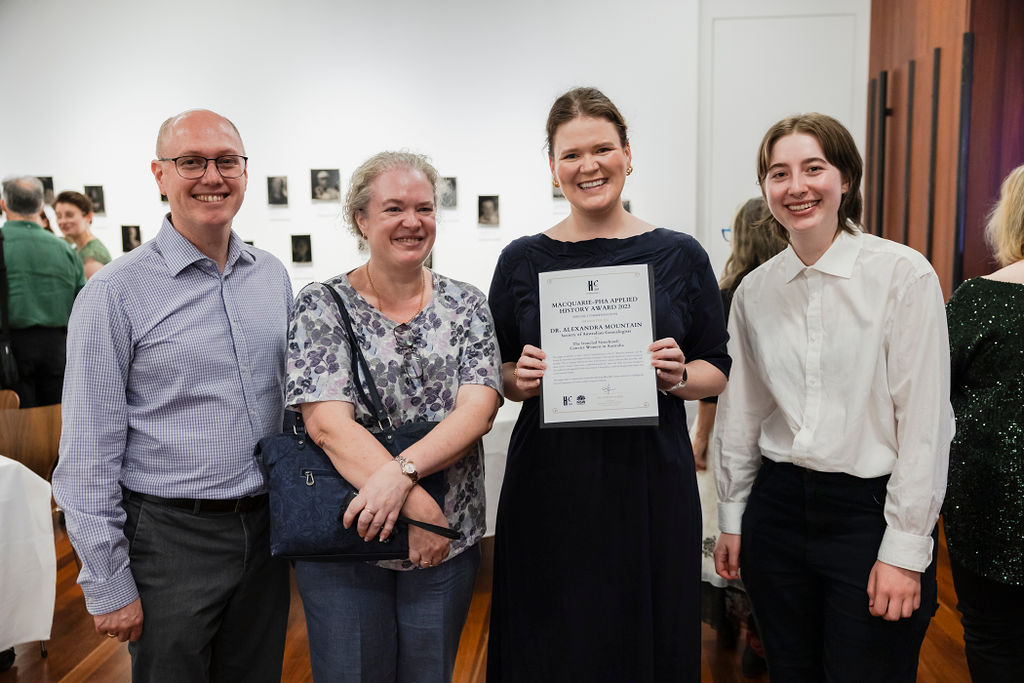
Special Commendation: Dr Alexandra Mountain (holding award) & team from the Society of Australian Geneaologists. Photo credit: Tim Harris, TWH Photography.
Max Kelly Award Winner – Zoe Smith
for her article ‘A prisoner on the rack’: Marital rape in late-nineteenth-century colonial women’s fiction.
The description of the paper states that it: “contributes to the growing body of historiography on marital rape in Australia, turning to the late nineteenth century, and considering how literary representations of ‘wife-beating’ and physical abuse in the fictional works of three colonial women – Barbara Baynton, Ada Cambridge, and Rosa Praed – explored the violation of women’s bodies as a whole.” The judges noted that the “difficult subject matter is well researched and explored, not only in the scope of the history of [the] authors’ published works, but in balancing this with the real-life experiences of these same authors or other women who could attest to the realities of domestic violence within marriage.”
A link to ‘A Prisoner on the Rack’ will be available on our website once the article has been published in 2024.
Special Commendation: Zoe Kniest
for her essay: Pastoralism, Politics, and Aboriginal People: The Maitland Mercury and Frontier Violence, 1843.
The judges noted that it was “an insightful contribution to the local level aspects of settlers’ violence in the colonial era”.
The link to Zoe Kniest’s essay will be provided once the essay has been published in 2024.
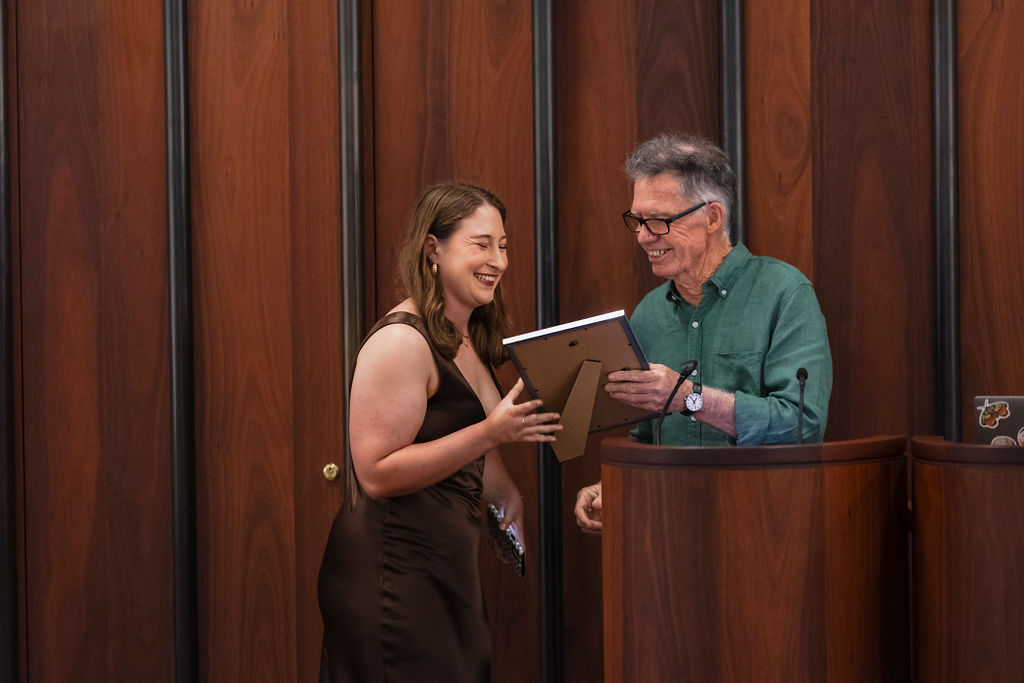
Winner: Zoe Smith. Photo Credit: Tim Harris, TWH Photography.
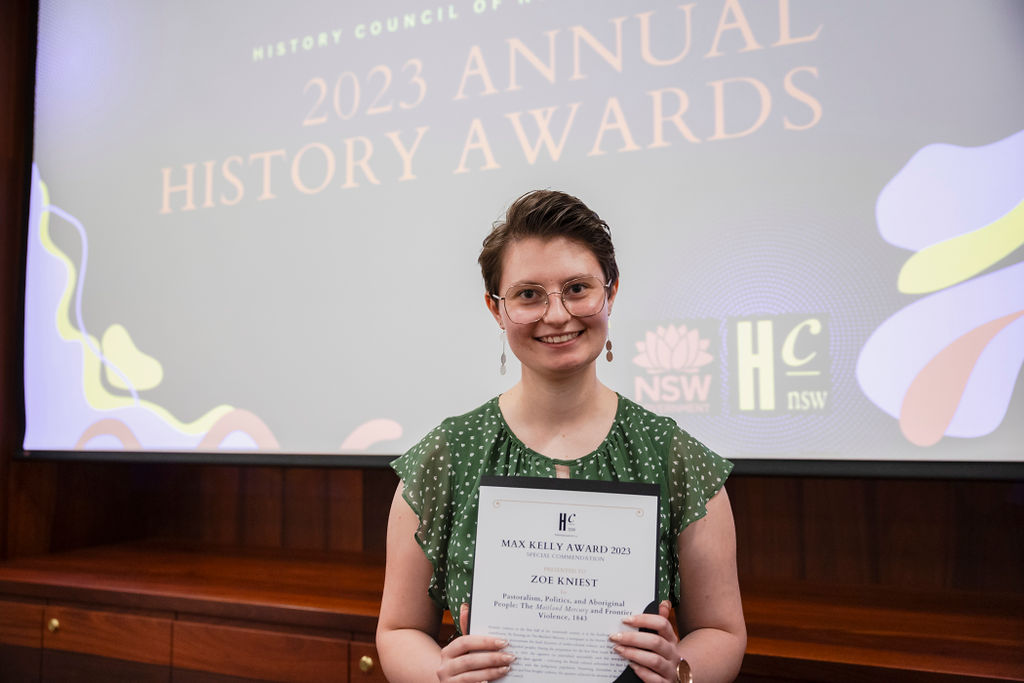
Special Commendation: Zoe Kniest. Photo Credit: Tim Harris, TWH Photography.
Jill Roe Regional History Award Winner –
Camden Council
for their exhibition Unlock Camden
The project description states that: Unlock Camden offers a dynamic and comprehensive celebration of Camden’s heritage, incorporating enthusiasts, community groups, historic displays, architectural heritage, and diverse activities. The immersive experience engages visitors of all ages, connects them with past, and fosters community pride and cultural preservation in a single, vibrant, annual event.
The judges noted that Unlock Camden facilitated greater community engagement and education through unlocking more local stories and events for audiences young and old.
Prize accepted by Nicole Magurren, Director Planning & Environment, Camden Council.
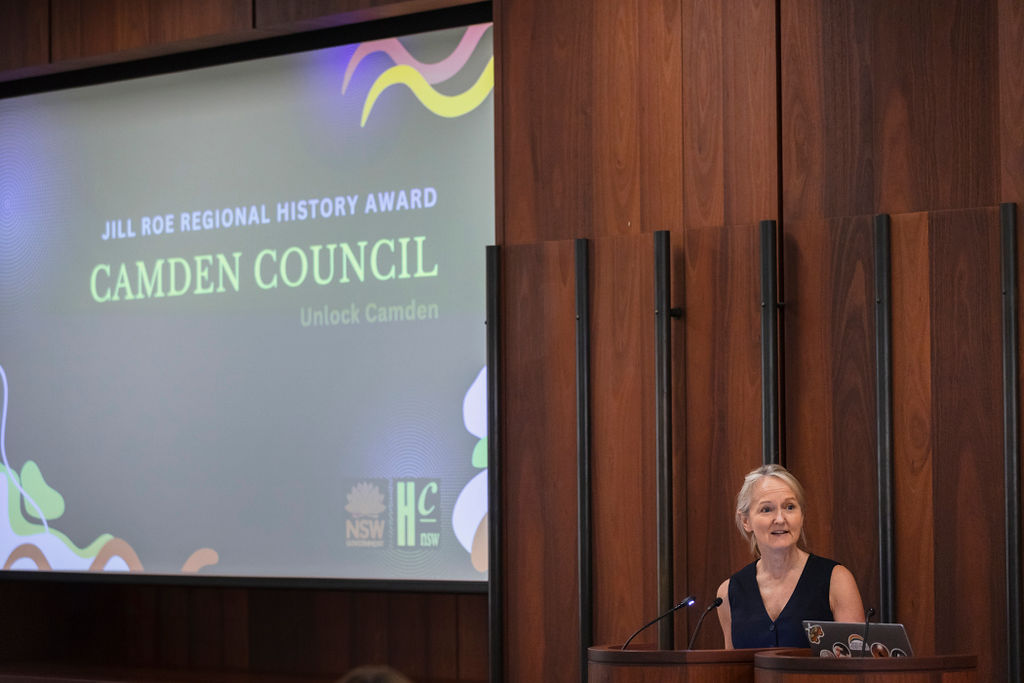
Winner: Camden Council. Photo credit: Tim Harris, TWH Photography.
First Nations History Award Winner –
Nadine Wilson
for her entry: Rebecca ‘Becky’ Johnston: A Worimi woman in colonial NSW 1858 to 1938.
This paper, which will form part of Nadine’s PhD, examines the life-course of Worimi woman Rebecca ‘Becky’ Johnston, and makes a strong contribution to knowledge of coastal Indigenous agency in the making of the modern nation. The judges applauded “the depth of this rich account of Becky’s life”.
The link to Nadine Wilson’s entry will be provided once the piece has been published in 2024.
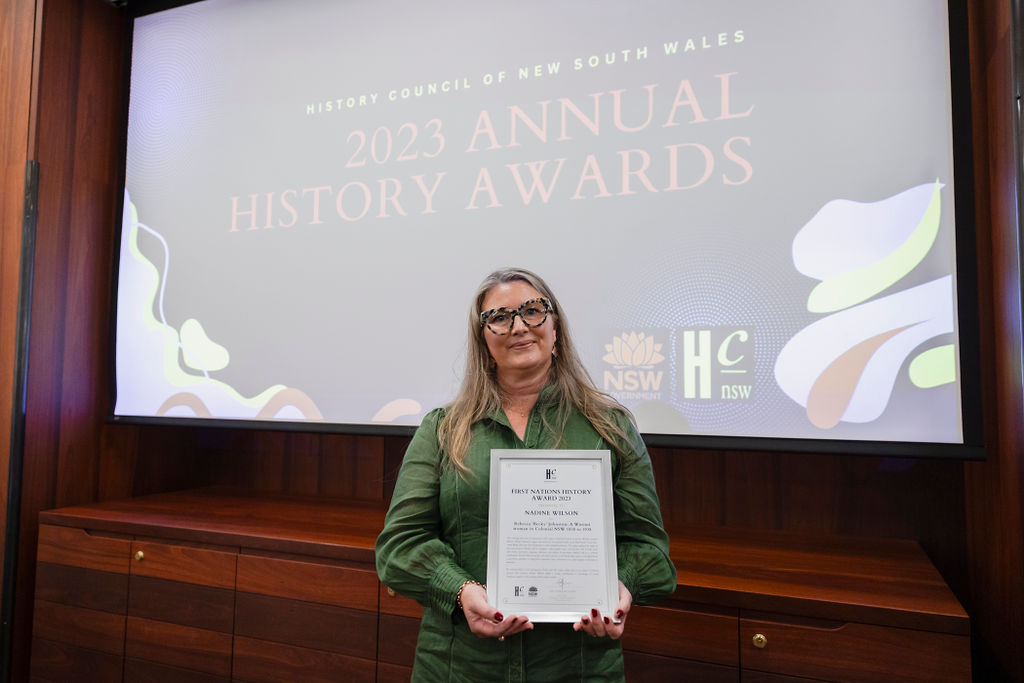
Winner: Nadine Wilson. Photo credit: Tim Harris, TWH Photography.
Annual History Citation Award
Emeritus Professor John Maynard
in recognition of his leadership in foregrounding First Nations voices and stories, and in inspiring other Indigenous people to be historians.
The Citation reads:
Professor Maynard’s career as an historian began when exploration of his family’s past revealed the untold history of 1920s Aboriginal activism by his grandfather and contemporaries. In the generation since then Professor Maynard has authored more than a dozen books and dozens more essay-length publications as well as participating in countless documentaries and interviews. As a leading voice for Indigenous people he has profoundly changed understanding of Australian history across themes such as political protest, Aboriginal sporting achievements, art history, and inter-racial relations arising from chance encounters through shipwrecks. Professor Maynard’s influence is global in his reconnection of activism by Aboriginal people and visiting workers of colour with African-American self-determination movements. He is one of Australia’s first Indigenous professors of History, a renowned mentor and advocate for Indigenous people, and a prolific and engaging public speaker. The History Council of New South Wales applauds Professor Maynard for forging new pathways into universities for Indigenous people and for communicating evidence of the strength and survival of First Nations to the wider Indigenous and non-Indigenous public.
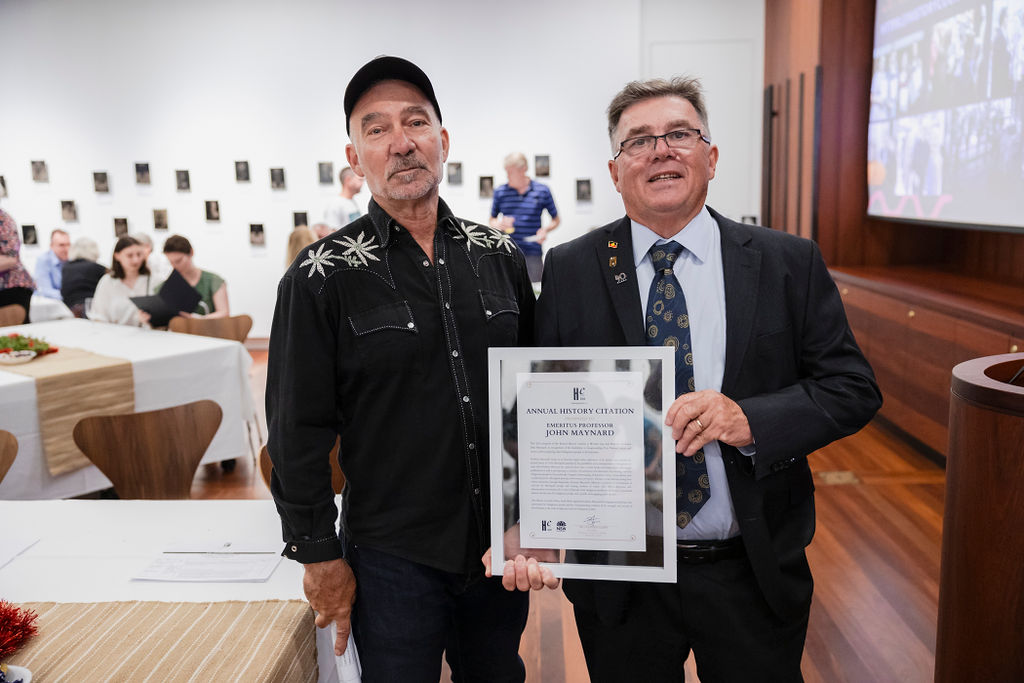
Winner: Professor John Maynard (R) with Dr Stephen Gapps.
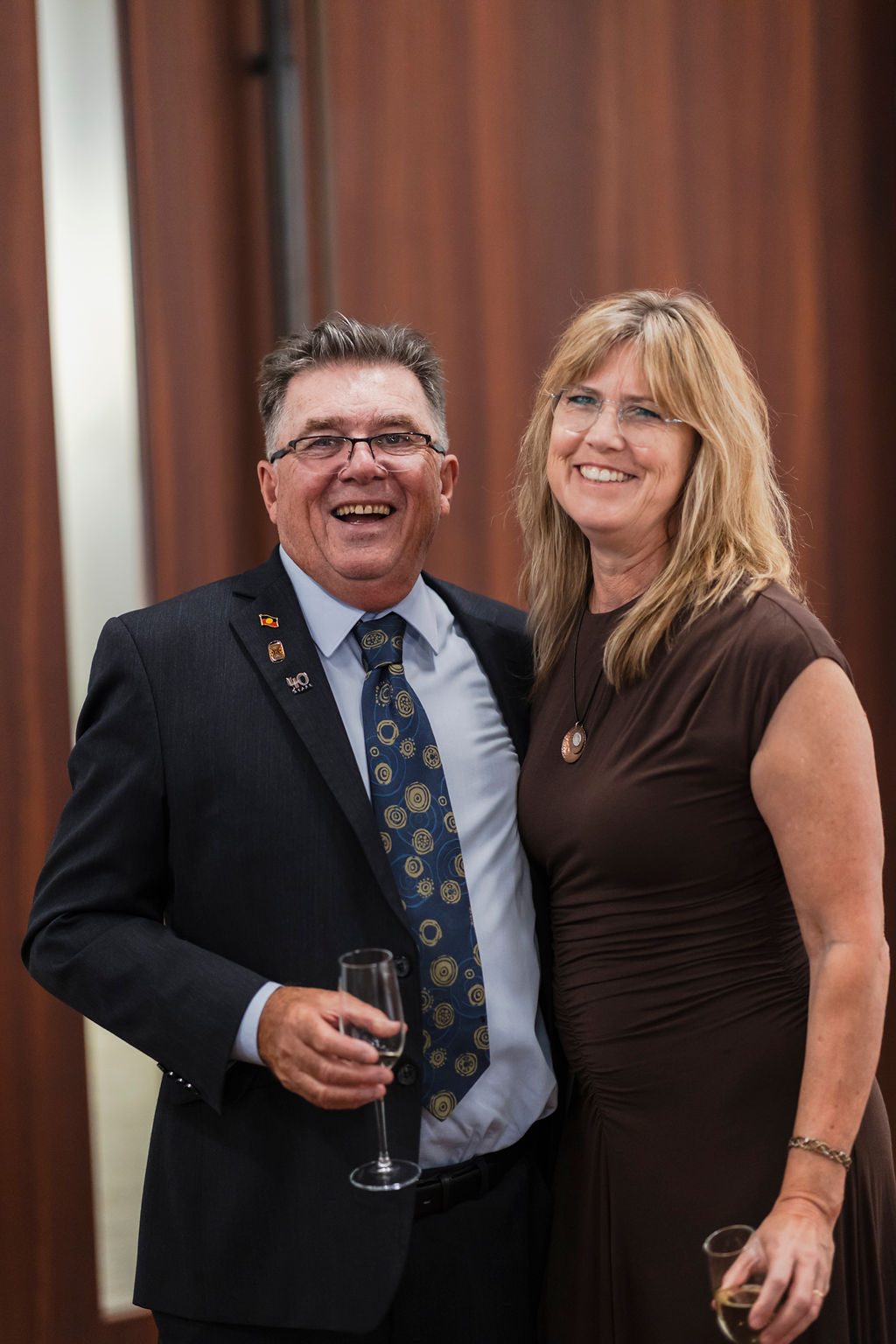
Winner: Professor John Maynard (L) with his wife, Professor Victoria Haskins. Photo credit: Tim Harris, TWH Photography
Create NSW Funding & Support
Information about funding and support available about this program can be accessed here.
Contact Us
